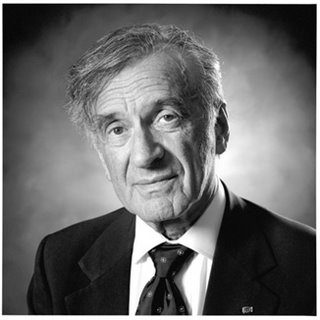 Today I come across a remarkable prayer, written by holocaust survivor Elie Wiesel. A Nobel Peace Prize laureate, Wiesel has spent his life reflecting upon his childhood experiences in Nazi concentration camps. Having lost both his parents and his young sister in the camps, he wandered for a time, caught up in the ragged hordes of post-war refugees, until he found his vocation as a novelist. Wiesel has dedicated his life to preventing other holocausts, and seeking justice and comfort for victims of racial, ethnic and religious hatred. He is one of the heroes of our time.
Today I come across a remarkable prayer, written by holocaust survivor Elie Wiesel. A Nobel Peace Prize laureate, Wiesel has spent his life reflecting upon his childhood experiences in Nazi concentration camps. Having lost both his parents and his young sister in the camps, he wandered for a time, caught up in the ragged hordes of post-war refugees, until he found his vocation as a novelist. Wiesel has dedicated his life to preventing other holocausts, and seeking justice and comfort for victims of racial, ethnic and religious hatred. He is one of the heroes of our time.He is also a man of faith: remarkably so, considering the trials he has gone through. Wiesel’s brutally honest, questioning faith is evident in this prayer, which is from his book, One Generation After:
“I no longer ask You for either happiness or paradise; all I ask of You is to listen and let me be aware and worthy of Your listening. I no longer ask You to resolve my questions, only to receive them and make them part of You. I no longer ask You for either rest or wisdom, I only ask You not to close me to gratitude, be it of the most trivial kind, or to surprise and friendship. Love? Love is not Yours to give.
As for my enemies, I do not ask You to punish them or even to enlighten them; I only ask You not to lend them Your mask and Your powers. If You must relinquish one or the other, give them Your powers, but not Your countenance.
They are modest, my prayers, and humble. I ask You what I might ask a stranger met by chance at twilight in a barren land. I ask You, God of Abraham, Isaac, and Jacob, to enable me to pronounce these words without betraying the child that transmitted them to me. God of Abraham, Isaac, and Jacob, enable me to forgive You and enable the child I once was to forgive me too. I no longer ask You for the life of that child, nor even for his faith. I only implore You to listen to him and act in such a way that You and I can listen to him together.”
 It’s both a prayer and a declaration of faith, spoken defiantly into the screaming void that is human suffering. There are more differences than similarities between my brief season of suffering through cancer, and that of a concentration-camp survivor like Elie Wiesel. His experience robbed him of both his childhood and his family – and, very nearly, his faith as well. Of course, there is the major difference that Wiesel was the victim of moral evil, and I of illness (a form of natural evil). Yet still, we call out to the heavens. And still, we discern in the silence a kind of answer.
It’s both a prayer and a declaration of faith, spoken defiantly into the screaming void that is human suffering. There are more differences than similarities between my brief season of suffering through cancer, and that of a concentration-camp survivor like Elie Wiesel. His experience robbed him of both his childhood and his family – and, very nearly, his faith as well. Of course, there is the major difference that Wiesel was the victim of moral evil, and I of illness (a form of natural evil). Yet still, we call out to the heavens. And still, we discern in the silence a kind of answer.The answer is Love.
No comments:
Post a Comment